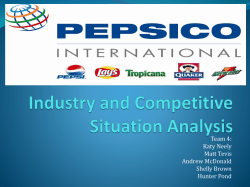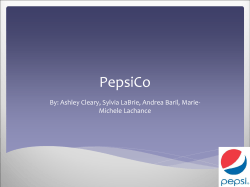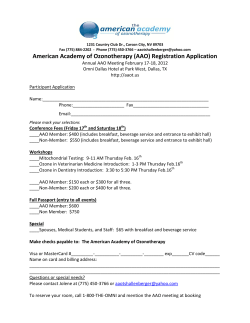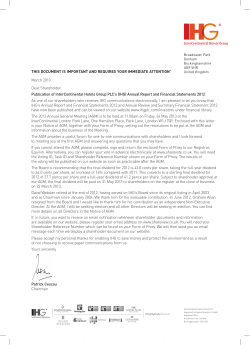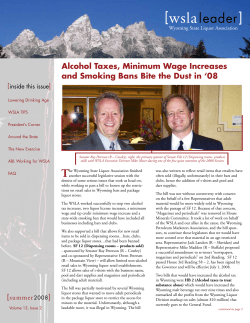
TRIAN PARTNERS DELIVERS LETTER AND WHITE PAPER TO PEPSICO BOARD
TRIAN PARTNERS DELIVERS LETTER AND WHITE PAPER TO PEPSICO BOARD Outlines Compelling Case For Separating Global Snacks And Beverages Businesses To Increase Shareholder Value Amid PepsiCo’s Continuing Underperformance Will Engage Fellow Shareholders In Public Dialogue NEW YORK, February 20, 2014 – Trian Fund Management, L.P. (“Trian”), whose investment funds beneficially own approximately $1.2 billion of PepsiCo, Inc. (NYSE: PEP) common shares, today released a letter to PepsiCo’s Board of Directors and a 31-page white paper detailing why separating global snacks and beverages into two independent public companies is the right long-term decision for the business and would create substantial value for shareholders. Trian has had discussions for months with PepsiCo Board members and senior executives about PepsiCo’s historical underperformance and the logic of separating it into “pure play” beverages and snacks companies. Accordingly, Trian was highly disappointed by PepsiCo’s February 13th announcement that its strategic review is completed and it has decided not to make structural changes. Trian believes the decision is one for shareholders, and it will immediately begin to engage fellow shareholders in a public dialogue with the goal of creating a groundswell of support for a separation of snacks and beverages. Trian hopes to facilitate positive change at PepsiCo with the power of the argument. To advance shareholder dialogue, Trian is making public its updated white paper supporting a separation of PepsiCo’s global snacks and beverages businesses. The letter and white paper analyze the challenges inherent in PepsiCo’s current structure and outline what Trian believes to be the best path forward for the Company to generate sustainable increases in long-term shareholder value: Trian is concerned by PepsiCo’s continuing underperformance since 2006 which Trian believes is due primarily to PepsiCo’s misguided reliance on the “Power of One” strategy. Last week, PepsiCo reported low-quality EPS growth in 2013, deteriorating trends in its North American beverages business and weak 2014 guidance, reinforcing Trian’s view that now is the time for decisive structural action. Trian does not agree with the outcome of PepsiCo’s strategic review, particularly following another quarter of uninspiring performance and weak 2014 guidance. Trian believes PepsiCo’s conclusion that the “current structure maximizes value” is at odds with many years of subpar operating results, and that its rationale for maintaining the current structure is highly subjective and lacks analytical support. Trian believes separating snacks and beverages into two independent public companies will maximize value. Trian believes standalone snacks and beverage companies, positioned correctly in the market, would unlock value at PepsiCo. A separation would create two leaner and more entrepreneurial companies – a standalone snacks business would offer investors strong growth in sales, margins and free cash flow generation, and a standalone beverage business would provide strong, stable free cash flow that may be optimized through an effective balance sheet and capital return program. Separating snacks and beverages would eliminate PepsiCo’s current holding company structure, remove layers of unproductive overhead, drive cost savings to reinvest in the brands, and foster operating and cultural benefits. Trian believes a standalone beverage business will generate strong, stable free cash flow today and higher cash flow in the future under focused leadership. As a sign of its commitment and confidence in the standalone beverage business, Trian is willing to buy additional shares and, if asked, join the Board of a newly formed beverage company to help lead it on the best path forward. The market has spoken: the status quo is not working and the market agrees with Trian that change is needed. Last July, Trian publicly advocated a separation of snacks and beverages and PepsiCo shares traded up to approximately $87 per share. Since then, PepsiCo has backed away from a separation of snacks and beverages, culminating with last week’s announcement. PepsiCo shares have now retreated to $77.10 as of yesterday’s close, a loss of approximately $15 billion in market value. Trian's letter to the Board follows: February 19, 2014 Mr. Ian M. Cook, Presiding Director PepsiCo, Inc. 700 Anderson Hill Road Purchase, NY 10577 Dear Ian: Investment funds managed by Trian Fund Management, L.P. (collectively “Trian”) beneficially own approximately $1.2bn of PepsiCo common stock. We appreciate your and Lloyd Trotter’s willingness to meet shortly after our first communication to PepsiCo’s Board advocating for structural change in early November 2013. We also appreciate our dialogue with CEO Indra Nooyi and members of her management team. Both management and the Board have been cordial in our dealings. However, it is clear we have vastly different views on the best path forward for PepsiCo. It appears that PepsiCo views structural change as a sign of weakness, an admission of failure and an untenable break with past traditions. Trian views structural change as the best path forward to generate sustainable increases in shareholder value. As you know, we are extremely concerned about PepsiCo’s extended period of underperformance relative to its food and beverage peers. The deteriorating trends in North American Beverage, questionable quality of earnings in 2013 and disappointing 2014 guidance reinforce our view that now is the time for decisive action. We believe the best way to ensure improved performance at PepsiCo is to separate global snacks and beverages, putting the future of each business in the hands of empowered and focused management. We were highly disappointed last week with the results of PepsiCo’s strategic review, especially in light of another quarter of uninspiring performance and, most disturbingly, weak 2014 guidance. Management and the Board’s conclusion that the “current structure maximizes value” is at odds with many years of subpar operating results.i We also find management’s rationale for maintaining the current structure highly subjective, full of platitudes and lacking strong supporting analytics, such as:ii First, management argues that pairing beverages and snacks provides critical scale that makes PepsiCo more relevant to its customers and provides synergies in areas such as procurement, customer insights, advertising, coordinated national account activity and international expansion. We ask: what is the benefit of scale and synergies if PepsiCo loses market share in critical segments and delivers lower margins, earnings per share (EPS) growth and total shareholder returns than peers over an extended period of time? Moreover, we believe that the $0.8-1.0bn of dis-synergies that management highlights can be more than 100% offset through the reduction of PepsiCo’s $1.1bn of unallocated corporate costs and a “blank sheet of paper” process to drive leaner cost structures at the operating divisions.iii We also note that shareholders pay a heavy price for the integrated strategy. If you multiply the company’s $1.1bn of unallocated corporate costs (which would be eliminated if the businesses were separated) by 11x (PepsiCo’s multiple of enterprise value / 2014 earnings before interest, taxes, depreciation and amortization), it costs shareholders $12bn of value, or $8 per share, to have beverages and snacks together in a holding company structure. If you also added the portion of corporate costs actually allocated to the segments (not publicly available but we estimate at least as much as the unallocated cost), the cost per share is likely much greater than $8. We would be willing to pay that per share cost in return for PepsiCo consistently delivering better growth and margins than competitors in each of its businesses. However, given PepsiCo has delivered inferior results over many years, we believe the holding company structure should be eliminated along with the related costs. These savings can provide standalone management with funds to reinvest in the brands and drive profits, creating a multiplier effect in building long-term shareholder value. Second, management argues that a separation would forfeit value creation from sweetener technology and productivity savings. It is important to understand that we never advocated a sale of the business. Rather, we recommended a spin-off so that shareholders can participate in future upside. Moreover, we believe the probability of productivity hitting the bottom line and sweetener technology having a material impact increases if there is a standalone management team with “no place to hide.” Third, management argues that U.S. cash flow from the beverage business is necessary to provide cash returns to shareholders. We question the accuracy of this statement on several grounds. Most notably, we believe two $30bn+ standalone snacks and beverage companies anchored by large North American businesses (Frito-Lay North America and Americas Beverages) would each generate sufficient cash flow to pay dividends and invest for growth. Fourth, management argues a separation would “jeopardize [PepsiCo’s] ability to grow in foodservice.” As the largest shareholder of Wendy’s, we have seen first-hand how PepsiCo has been outmaneuvered by Coca-Cola in the foodservice market. The most glaring example is the Coke Freestyle machine which allows customers to customize their beverages with 100-plus flavor options. Meanwhile, Pepsi’s version of a Freestyle machine has yet to materialize, even though Nelson was told by the CEO in mid-2012 that 1,000 technologically competitive units would be in the market by the end of 2012. This is another example of PepsiCo’s “connected autonomy” slowing down innovation and negatively impacting the ability to compete. Finally, a reason cited by some as to why snacks and beverages should not be separated is that a standalone PepsiCo beverage business cannot compete effectively against Coca-Cola. We disagree and would note: a) PepsiCo has not competed effectively against Coca-Cola for many years, even with snacks in its arsenal; b) Dr Pepper Snapple has shined since it was spun-off from Cadbury in 2008 (in the middle of a financial crisis) and has outmaneuvered both Coke and Pepsi over the past five years. In fact, Dr Pepper Snapple grew EPS more than PepsiCo in 2013 and forecasts similar growth to PepsiCo in 2014 despite a weaker portfolio, no exposure to snacks and more exposure to N. American carbonated soft drinks; and c) PepsiCo has some of the best beverage brands in the world (e.g., Gatorade, Tropicana, Mountain Dew, Pepsi, Starbucks and Lipton, among others). The beverage business generates strong, stable free cash flow today and we believe can generate far more cash flow under focused leadership. Freed of allocated corporate costs and bureaucracy, and able to be nimble and lean, we believe a standalone beverage business will not only compete, but thrive. Trian has so much conviction in the value of a standalone beverage business that we would buy additional shares and be willing to join the Board of the newly formed beverage company to help lead it going forward. In the end, the wisdom or fallacy of an integrated portfolio is quantifiable. While management says “holistically, this portfolio provides a platform for balanced growth, margin and return improvement…all of which leads to top-tier total shareholder return,” it simply is not true.iv The results are unambiguous: during the CEO’s seven-plus year tenure, PepsiCo’s total shareholder return of 47% has grown at less than half the rate of the Consumer Staples Index (103%) and competitors like Coca-Cola (115%). PepsiCo’s EPS growth has also significantly trailed that of peers.v Management will inevitably defend performance by questioning our timeframes. They argue that if you go back further, PepsiCo’s performance looks better. However, we did not choose our timeframe arbitrarily. We did so because 2006 marks the beginning of current management’s tenure. As importantly, it also coincides with the transformation of “Power of One” from a marketing slogan with limited operational impact to a pervasive strategy that increased the influence and control of corporate. We view this strategy – now described euphemistically as “connected autonomy” – as largely responsible for a diminished PepsiCo culture and deteriorating performance. We believe that separating snacks and beverages would create a clean structural break that would eliminate corporate bureaucracy, return power and autonomy to the operating divisions, increase accountability and re-energize division management. Last week’s earnings announcement and 2014 guidance reinforce our view. Backing out the benefits of a lower-than-expected tax rate and a one-time Vietnam refranchising gain that has no place in “core” earnings, EPS grew only 5% in 2013.vi That follows a major EPS re-set in 2012 that was supposed to have re-ignited growth. The Company’s share price underperformed the Consumer Staples Index by 500 basis points (bps) during the next two trading days.vii Meanwhile, guidance for 2014 was weak. Despite plans to buy back 4% of the shares during 2014, a lower share count to begin the year, what should be a lower initial cost base given last year’s $1bn of supposed cost savings, another $1bn of promised cost savings planned for 2014 and nearly 100 bps of tax rate favorability, management expects only 7% constant currency EPS growth in 2014 – the low-end of its long-term target and its peer group.viii Other notable observations from last week’s announcement: $3bn of cost savings from 2012-2014 are not expected to hit the bottom line, suggesting the core business is declining. 2014 EPS is expected to be only $4.50, in-line with 2011 levels.ix PepsiCo continues to lose market share in its struggling Americas Beverage unit, as the company has been consistently out-innovated and outmaneuvered by Coca-Cola (e.g., Coke Zero, Simply Orange, Freestyle, PlantBottle, transition to more popular package sizes, Green Mountain partnership).x This has put increasing and unnecessary pressure on the company’s other divisions such as Frito-Lay, which we believe would be one of the best performing and most highly valued food companies on its own. The market appears to agree with us. When we publicly presented our White Paper last July, which advocated a separation of beverages and snacks, the market ascribed an increased probability to such a transaction. PepsiCo stock traded up to $87 per share and may have climbed higher had there been a formal announcement of structural change. With management since talking down the likelihood of a separation, culminating with last week’s formal announcement, PepsiCo’s stock has retreated to $78 per share. Overall, PepsiCo has lost $15bn of market capitalization since July during a period when both the S&P 500 and Consumer Staples Index have appreciated.xi We believe this share price decline sends two clear messages: 1) PepsiCo is worth more and would be run better as two separate companies; and 2) the Board and management’s decision not to separate goes against shareholders’ best interests. While the company has been willing to use its balance sheet to prop up EPS through share repurchases, we do not understand why it refuses to use its balance sheet to create stronger standalone snacks and beverage businesses. Each should be capitalized to optimize value based on different growth profiles, strategic plans and shareholder objectives. PepsiCo should eliminate its holding company structure, along with layers of value-destructive overhead and excess costs. Standalone management teams should be “unshackled” to invest as they see fit, price as they want and take risks by moving quickly to introduce new products. Granting those running the divisions authority to control their destiny may make corporate leadership in Purchase uncomfortable – but we suspect division leadership and employees within Pepsi and Frito-Lay would be reinvigorated. Our recommendations are consistent with the successful blueprint that PepsiCo utilized for decades when the company was run entrepreneurially and was the “industry disruptor.” For many years, PepsiCo competed successfully from a #2 position by keeping Coke off-balance. Now Coke has PepsiCo on its heels and PepsiCo has too much bureaucracy to compete more effectively. That is a recipe for mediocrity, at best. Likewise, PepsiCo was once an incubator of some of the best management talent in the consumer industry. We believe PepsiCo has lost that management edge due to its holding company and centralized structure. As support for our recommendations, we have updated our comprehensive strategic analysis (“The Case For Separating Global Snacks & Beverages”), which we previously shared with you in November. It shows: How PepsiCo’s corporate culture has deteriorated over time as the company lost key elements of its identity. A review of PepsiCo’s underperformance versus peers from 2006 through today – a time that coincides with current management’s tenure and strategic emphasis on “Power of One.” We note how declines in advertising spending and aggressive Frito-Lay price increases artificially supported profits in the years before the earnings re-set in 2012. If PepsiCo continues down this path, we foresee an ongoing cycle whereby management intermittently re-sets EPS lower, delivers several years of unsustainable growth, only to re-set EPS again when brand reinvestment is inevitably needed. Examples of how beverages and snacks have hurt each other under the current holding company structure and why we are troubled by trends in both businesses. How at a meeting in the fall of 2013, CEO Indra Nooyi told Nelson that the acquisition of the bottlers was a “mistake,” thereby conceding that $21bn ($17bn excluding the equity PepsiCo previously owned in the bottlers) was misspent. Why we believe the snacks and beverage businesses would be better positioned for success following a separation. Benefits include eliminating the holding company structure, removing layers of unproductive corporate overhead, creating two leaner and more entrepreneurial companies and driving cost savings to reinvest in the brands. Details of how efforts to mitigate dis-synergies upon separation can deliver net savings to the bottom-line and examples of spin-off successes (including two PepsiCo spin-offs). Significant value can be unlocked when large companies separate businesses to create focus. The Bloomberg U.S. Spin-Off Index, representing companies that were recently spun-off from a parent, has generated a 286% total return versus 148% for the S&P 500 over the past five years.xii More importantly, both the parent and the spun-off companies tend to become stronger competitors driven by highly empowered management teams. Two recent examples are Kraft / Mondelez and News Corp / 21st Century Fox, which have created $32bn and $31bn of market capitalization, respectively, since announcing separations.xiii In the case of Kraft, we applaud CEO Irene Rosenfeld and the Board for separating the portfolio along its natural fault lines. The company was willing to become smaller (and drop out of the Dow 30) in order to unlock value for shareholders. In the case of News Corp, it is unlikely that an outsider could have forced a separation given Rupert Murdoch’s voting control. Moreover, we would guess Mr. Murdoch was not anxious to have twice the number of board meetings and direct management reports. Nevertheless, he made the best decision for his businesses and, in doing so, created considerable value for all News Corp shareholders. While we had hoped that PepsiCo’s management and Board would make the best decision for their businesses and enhance long-term value for shareholders, this has not occurred. And while we understand that management believes the structural review has been completed and hopes to maintain the status quo, we believe the decision is one for the owners of the company. As such, while we remain open to continued dialogue with PepsiCo’s management and Board, we have decided to broaden our communications with our fellow shareholders. We intend to begin meeting with shareholders immediately and will consider conducting public shareholder forums. We ask that shareholders examine the company’s record for themselves and review the questions we raise in the attached analysis. We believe many shareholders already agree with us and we will look to inform those who may not have strong views that ours is the right path forward for the company. In addition, we will closely monitor PepsiCo’s performance and hold management publicly accountable for delivering top-tier shareholder returns. Our goal will be to facilitate positive change by cutting through the rhetoric with thoughtful and quantifiable analysis, thereby creating a groundswell of support such that PepsiCo’s Board concludes it must take actions that are truly in the best long-term interests of its underlying businesses and its shareholders. Very truly yours, Nelson Peltz Founding Partner & Chief Executive Officer Peter May Founding Partner & President Ed Garden Founding Partner & Chief Investment Officer Josh Frank Partner and Senior Analyst cc: PepsiCo Board of Directors End Notes i Source: Q4 2013 press release. Source: Q4 2013 transcript and slide presentation. iii Source: Q4 2013 slide presentation, PepsiCo Q4 2013 press release and Trian calculations. Unallocated corporate excludes depreciation and amortization and pension. iv Source: PepsiCo Q4 2013 transcript. v Source: Bloomberg as of 2.14.2014 and PepsiCo and Coca-Cola Q4 2013 press releases. vi Source: PepsiCo Q2 2013 and Q4 2013 press releases and Trian estimates. vii Source: Bloomberg. viii Source: PepsiCo Q4 2013 press release and Trian estimates. ix Source: PepsiCo Q4 2013 press release and slide presentation and Trian estimates. PepsiCo’s 2014 EBIT is projected to essentially be in-line with its 2011 EBIT. x See pages 13 and 14 for further detail. xi Source: Bloomberg and SEC filings. Date as of July is July 18, 2013 (the day after Trian’s presentation calling for a separation was made public). “Today” is as of February 14, 2014. xii Source: Bloomberg as of 2.14.2014. xiii Source: Capital IQ as of 2.14.2014 and 8.4.2011 for Kraft and 2.14.2014 and 6.28.2012 for News Corp and SEC filings. ii # # # About Trian Fund Management, L.P. Founded in 2005 by Nelson Peltz, Peter May and Ed Garden, Trian seeks to invest in high quality but undervalued and under-performing public companies and to work constructively with the management and boards of those companies to significantly enhance shareholder value for all shareholders through a combination of improved operational execution, strategic re-direction, more efficient capital allocation and increased focus. Media Contact: Anne A. Tarbell (212) 451-3030 atarbell@trianpartners.com The views expressed in this press release represent the opinions of Trian Fund Management, L.P. (“Trian”) and the funds it manages (collectively, “Trian Partners”), and are based on publicly available information with respect to PepsiCo, Inc. (the “Issuer”). Trian Partners recognizes that there may be confidential information in the possession of the Issuer that could lead it to disagree with Trian Partners’ conclusions. Trian Partners reserves the right to change any of its opinions expressed herein at any time as it deems appropriate. Trian Partners disclaims any obligation to update the data, information or opinions contained in this press release. Certain financial information and data used herein have been derived or obtained from filings made with the Securities and Exchange Commission (“SEC”) or other regulatory authorities and from other third party reports. Neither Trian Partners nor any of its affiliates shall be responsible or have any liability for any misinformation contained in any third party SEC or other regulatory filing or third party report. There is no assurance or guarantee with respect to the prices at which any securities of companies referred to herein will trade, and such securities may not trade at prices that may be implied herein. The estimates, projections, pro forma information and potential impact of the opportunities identified by Trian Partners herein are based on assumptions that Trian Partners believes to be reasonable as of the date of this press release, but there can be no assurance or guarantee that actual results or performance of the Issuer will not differ, and such differences may be material. This press release is provided merely as information and is not intended to be, nor should it be construed as, an offer to sell or a solicitation of an offer to buy any security. This press release does not recommend the purchase or sale of any security. Funds managed by Trian currently beneficially own, and/or have an economic interest in, shares of the Issuer. These funds are in the business of trading – buying and selling– securities. It is possible that there will be developments in the future that cause one or more of such funds from time to time to sell all or a portion of their holdings of the Issuer in open market transactions or otherwise (including via short sales), buy additional shares (in open market or privately negotiated transactions or otherwise), or trade in options, puts, calls or other derivative instruments relating to such shares. This press release contains forward-looking statements. All statements contained in this press release that are not clearly historical in nature or that necessarily depend on future events are forward-looking, and the words “anticipate,” “believe,” “expect,” “potential,” “opportunity,” “estimate,” “plan,” and similar expressions are generally intended to identify forward-looking statements. The projected results and statements contained in this press release that are not historical facts are based on current expectations, speak only as of the date of this press release and involve risks, uncertainties and other factors that may cause actual results, performance or achievements to be materially different from any future results, performance or achievements expressed or implied by such projected results and statements. Assumptions relating to the foregoing involve judgments with respect to, among other things, future economic, competitive and market conditions and future business decisions, all of which are difficult or impossible to predict accurately and many of which are beyond the control of Trian Partners. Although Trian Partners believes that the assumptions underlying the projected results or forward-looking statements are reasonable as of the date of this press release, any of the assumptions could be inaccurate and therefore, there can be no assurance that the projected results or forwardlooking statements included in this press release will prove to be accurate. In light of the significant uncertainties inherent in the projected results and forward-looking statements included in this press release, the inclusion of such information should not be regarded as a representation as to future results or that the objectives and strategic initiatives expressed or implied by such projected results and forward-looking statements will be achieved. Trian Partners will not undertake and specifically declines any obligation to disclose the results of any revisions that may be made to any projected results or forward-looking statements in this press release to reflect events or circumstances after the date of such projected results or statements or to reflect the occurrence of anticipated or unanticipated events.
© Copyright 2025

